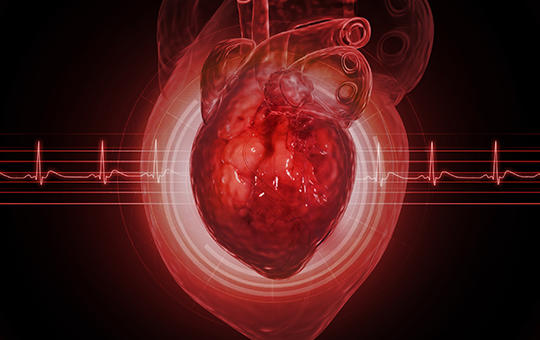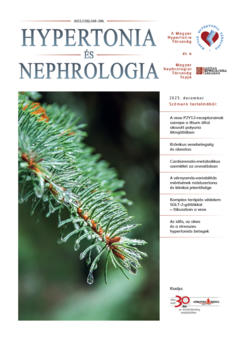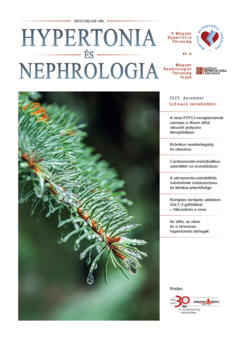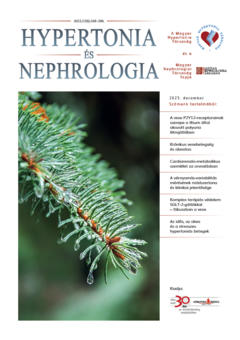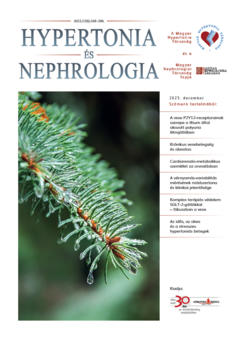The eLitMed.hu medical portal uses computer cookies for convenient operation. Detailed information can be found in the Cookie-policy.
Specialities
Nephrology
[Pharmacotherapy of chronic heart failure with reduced ejection fraction: vericiguat, the developing 5th pillar? ]
[The incidence and prevalence of chronic heart failure (HF) is increasing worldwide, its morbidity and mortality remains high, and its adequate management is of paramount importance. Currently the treatment of heart failure with reduced ejection fraction (HFrEF) relies on four pillars: ACE inhibitors/ARNI, β-blockers, MRAs, and as the newest class, SGLT-2 inhibitors, all of which have been proven to reduce mortality and morbidity in HFrEF patients. A relatively new therapeutic option for the pharmacotherapy of HFrEF is vericiguat a soluble guanylate cyclase stimulator, which modifies the NO-sGC-cGMP signaling pathway impaired in heart failure patients. Vericiguat activates the sGC enzyme independently of the presence of nitric oxide, resulting in elevated intracellular cGMP levels, which can improve endothelial, myocardial, and vascular functions alike. Safety and efficacy of vericiguat were confirmed in the VICTORIA trial. Vericiguat significantly reduced the composite endpoint of HF hospitalization and cardiovascular death compared to placebo in chronic HF patients recently hospitalized for HF or requiring parenteral diuretic therapy with an ejection fraction worse than 45%. The relative risk reduction was 10%, and the absolute risk reduction was 4.2% in the vericiguat group. Due to the positive outcomes observed in the VICTORIA trial, vericiguat was included as a new pharmacotherapeutic option in the 2021 ESC Heart Failure guidelines. The current recommendation suggests the use of vericiguat with a level IIb evidence for HFrEF patients who recently required medical care due to heart failure progression despite optimal pharmacotherapy. ]
[Reno- and cardioprotective effects of sodium-glucose cotransporter 2 inhibitors beyond treating diabetes mellitus ]
[SGLT2-inhibitors, originally used as antidiabetics, improved unexpectedly the outcome of cardiac diseases (mainly heart failure) and nearly halved the risk of renal events of diabetic patients. More recently, administering these drugs decreased significantly the morbidity and mortality in primary renal endpoint studies and among patients with heart failure – in diabetic and non-diabetic patients respectively. Concerning these recent outcomes and according to international and domestic guidelines, SGLT-2 inhibitors are considered as first line medications in both chronic kidney disease and the whole spectrum of chronic heart failure, and they should be initiated as early as possible in these conditions. Since the beginning of 2024, these drugs which changed significantly the outcome of these diseases can be prescribed with greater support of Hungarian public financing not only for type 2 diabetic patients but non-diabetics too with chronic kidney diseases and heart failure with reduced ejection fraction. ]
[Chronic kidney disease and obesity]
[Nowadays, the epidemic spread of obesity is mainly linked to changing environmental factors and is a serious public health problem. Obesity alone can be associated with increased mortality, but obesity is also an independent risk factor for several chronic diseases such as diabetes, hypertension and chronic kidney disease which have a major public health burden.]
[Cardio-renal-metabolic approach in medicine – thoughts, considerable information based on the new recommendations regarding SGLT2 inhibitors and GLP1 receptor agonists]
[Common complications of type 2 diabetes are chronic kidney failure and chronic heart failure. However, chronic renal failure and chronic heart failure can contribute to the development and deterioration of each other, and can be present earlier and more severely in the case of diabetes. Furthermore, type 2 diabetes might also occur more frequently in case of chronic kidney- and heart failure. All of these are often accompanied by atherosclerotic cardiovascular disease and hypertension.]
[Complex therapeutic protection with SGLT2 inhibitors, focusing on the kidney]
[In the EMPA-REG Outcome trial, it was already observed that cardiovascular (10.5% vs. 12.1%) and renal (1.7% vs. 3.1%) outcomes were better with empagliflozin treatment compared to placebo. The favorable effects of empagliflozin were consistent across the KDIGO risk categories. CVOT trials conducted with other SGLT2 inhibitors also concluded with promising renoprotective results.]
[Role of renal P2Y12 receptors in lithium-induced polyuria]
[Clinicians and investigators know since ages that increased production of prostaglandins play a significant role in the pathogenesis of polyuria of patients with Bartter syndrome.]
1.
Clinical Neuroscience
Is there any difference in mortality rates of atrial fibrillation detected before or after ischemic stroke?2.
Clinical Neuroscience
Factors influencing the level of stigma in Parkinson’s disease in western Turkey3.
Clinical Neuroscience
[The effects of demographic and clinical factors on the severity of poststroke aphasia]4.
Clinical Neuroscience
Neuropathic pain and mood disorders in earthquake survivors with peripheral nerve injuries5.
Journal of Nursing Theory and Practice
[Correlations of Sarcopenia, Frailty, Falls and Social Isolation – A Literature Review in the Light of Swedish Statistics]1.
2.
3.
4.
5.
